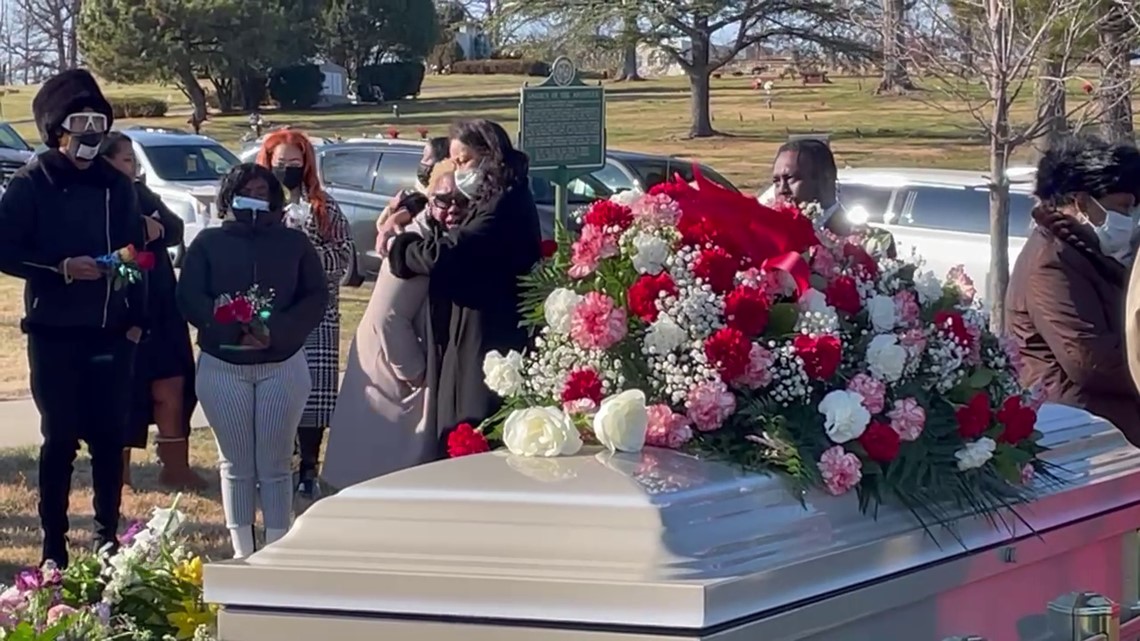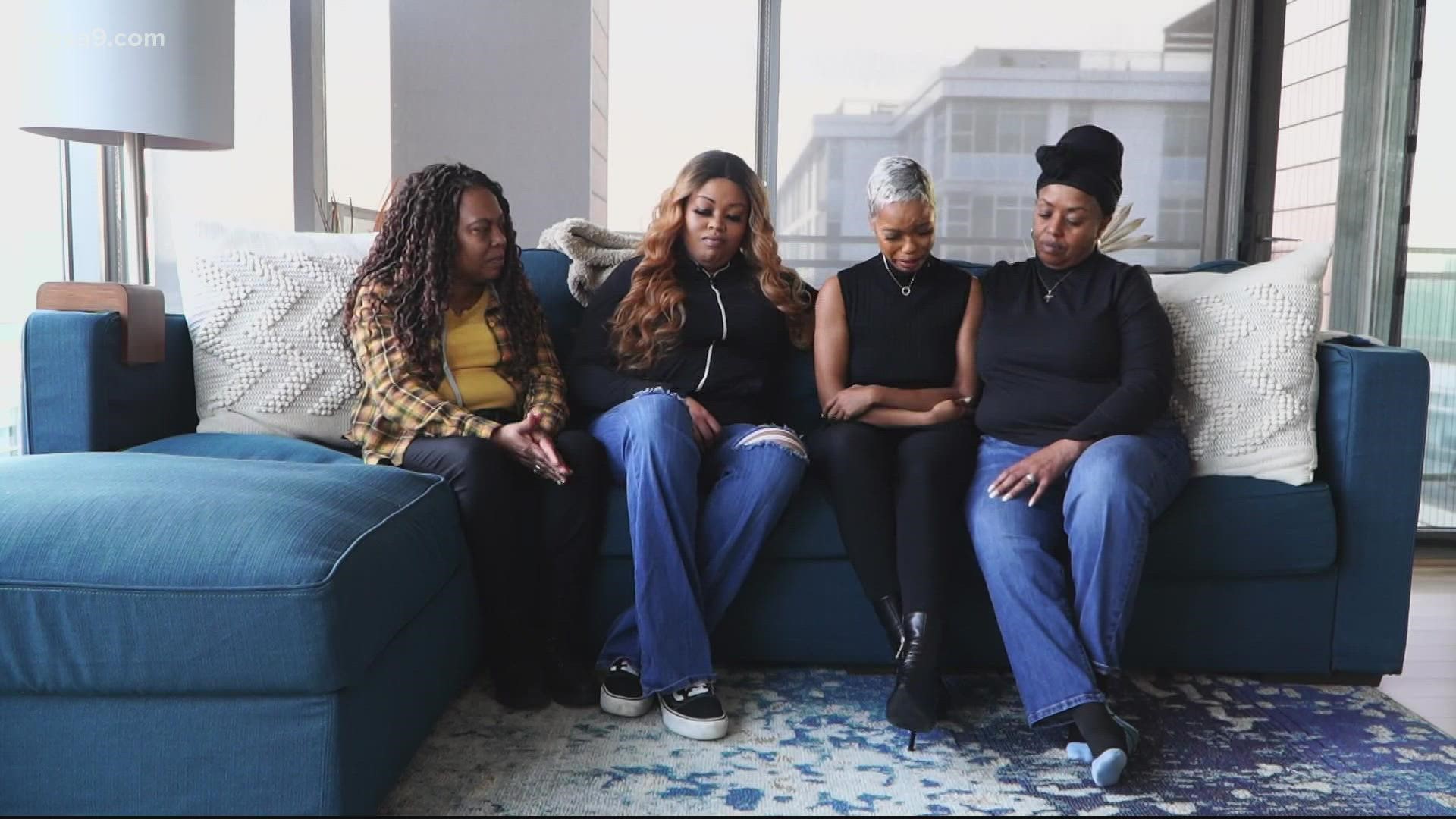WASHINGTON — Co-workers at D.C.’s Insurance Department called her Sylvia. Friends called her by her middle name Diane. Her family called her “D.” They believe the entire system failed Sylvia Diane Matthews before she was found dead on Dec. 3, 2021 in her Southwest D.C. home.
Michael Tyrone Garrett, who served more than two decades in prison for beating and robbing Matthews in 1999, is now charged with her murder.
Sheila Matthews is Sylvia’s niece and in many ways, the daughter she never had.
"My aunt didn’t have any children and it was always the running joke that I was her daughter and she treated me just like I was her daughter, especially after my dad passed, said Sheila Matthews. "To me, Dec. 3 is the day the city sent a very loud and clear message to women, that they don’t care."
Debra McCombs recalled memories of her cousin Sylvia.
"For me, it’s her laugh because she enjoyed life and she would make you laugh. She would make you laugh if you didn’t feel like laughing about something," said Combs.
Garrett was born in 1952, had no father in his life, a mother who gave birth at 15, three siblings and three children he lost contact with, according to court documents. Starting in 1975 with a gun conviction, to 1980s charges and/or convictions for kidnapping, multiple burglaries, assaults, rape, cocaine possession in D.C. and Maryland. Garrett had 32 arrests and 14 convictions by 1999.
In 1996, Garrett said he met Sylvia Diane Matthews. Her family said at the time, Matthews was a drug-abuse counselor at the old D.C. Jail in Lorton, Virginia.
Court documents later state Garrett and Matthews were "in a relationship" after Garrett's 1998 D.C. Jail release.


In November 1998, while in a car together, a witness watched as Garrett attacked Matthews in the face with a hammer. She suffered major face wounds, according to court documents.
In January 1999, Matthews was at her home, shared with her mother, on Elmira Street in Southwest D.C. Garrett broke into the house by prying open a door. She ran to the neighbor's house and called 9-1-1. Police found Garrett in Sylvia’s basement with a crack pipe, all according to court documents.
Garrett was sentenced to 24 years in prison for multiple burglary and assault charges. There is a legal debate about whether the sentences were to be served consecutively or concurrently. Depending on that, his sentence was to end either in 2023 or 2035.
Court documents reveal that in 2014, while in prison, Garrett was attacked in the cafeteria by an inmate on drugs. His eye was stabbed with a spork. He became blind in his left eye. His right eye later developed glaucoma. Garrett complained of constant eye pain and medical records show with glasses, he had 20/20 vision.


Prison psychologists determined that Garrett had a temper and inner rage at his parents for not being there.
“I need someone to love me,” Garrett states. Also in prison, Garrett threatens a female guard, saying, “If I get back out on the compound, I’ll show you what type of man I am.”
For that, and the violent nature of Garrett’s past, when he applies for compassionate release from the federal prison in West Virginia due to his cellmate getting COVID-19, the U.S. Attorney’s office opposed the Jan. 2021 court motion. His pro-bono attorney convinced federal judge Robert Okun that due to his age, his failing eyesight, and pledges to never contact victim Sylvia Mathews again, Garrett was released in March.
In the U.S. Attorney’s opposition, prosecutors said due “to the age of the case and the closure of the federal records center” they have been unable to notify the victim or their family about a possible release.
But, the Federal Records Center told WUSA9 it has no record of an information request on the Garrett case from the U.S. Attorney’s Office. The U.S. Attorney’s Office has not replied to our questions about this contradiction.
That inability to contact Matthews' family about Garrett's early release did not appear to be a factor in the judge’s decision. Judge Robert Okun's office declined to comment.
Matthews' family said nobody within the family had any idea the man convicted of beating and robbing Sylvia Matthews knew about the early jail release. Sheila Matthews recalled the lingering fears her aunt had after the 1999 attack.
"Four locks on the back door, three locks on the front door, baseball bats by the bed and the basement was like Fort Knox. So many locks on the basement door," said Sheila.
"After he went back to jail, we kind of forgot about him. You don’t think that someone goes to jail for disrupting you and then it’s going to come back and get you again," Sylvia's cousin, Diane McCombs added.
On Oct. 7, Matthews calls MPD because Garrett was outside her door demanding to come in. She declined his demands and he tried to force his way in, verbally threatening to kill her, according to Matthews. MPD responded and arrested Garrett. For reasons unknown, U.S. Attorney’s office declined to prosecute and declined to further explain to WUSA9.
An MPD General Order states a police officer must try to connect domestic violence survivors with counselors at the non-profit organization D.C. SAFE who ask questions to provide relocation options. But, Matthews never talked to a counselor according to D.C. SAFE. Why it didn’t happen is under internal review by the group.
When asked if Matthews could still be alive if a D.C. SAFE counselor had been able to ask those questions, Natalia Otero with D.C. SAFE responded, "I think it’s possible. It was a little bit of the straw that broke the camel's back for me. We had been seeing increases in homicides in survivors that we were actively dealing with. There was something about the specifics of her case that just lit a fire under me."
RELATED: 'Something is different in 2021' | Police fear more domestic violence cases this holiday season
On Oct. 15, Garrett’s probation officer filed a notice of non-compliance to the court. His probation officer reported visiting Garrett at a homeless encampment near 9th and K Street Northwest to remind him not to have contact with Matthews as he pledged. The probation officer wrote that due to the Oct. 7 arrest not being prosecuted, no further action should be taken other than "increased supervision."
On Oct. 22, Matthews told MPD that Garrett confronted her outside a grocery store near her place of work. Matthews worked for the D.C. Government processing insurance claims against the District. It was a 20-minute walk from Garrett's tent.
Matthews said Garrett took a corkscrew to her throat and threatened to kill her. MPD now claims that they suspended their investigation into this incident due to “multiple attempts to reach” Matthews were unsuccessful."
Even after these Oct. 2021 incidents, the Matthews family said Sylvia kept them in the dark about Michael Garrett's presence in her life.
"I think it was because she knew she was being silenced and she was reaching out and she was doing everything she was supposed to do and she wasn’t getting help, so why involve your family?" said Sheila Matthews. "I think she didn’t have answers to the questions because she was asking them and the police couldn’t give her answers about why he was out, why he got out, how he was finding her, what should I do?"
"She was trying to protect us all and we just couldn’t see it. We didn’t know," said Danielle McCombs.
"No. Even when I saw her that Monday before, there were absolutely no signs." Cousin Regina Taylor added.
"She carried all of that, for however long she knew he was out, that’s mindblowing to me," said cousin and retired police officer, Debra McCombs.
Police reports for Friday, Dec. 3 state that around 7:30 a.m. police said that Sylvia Matthews called and said that Garrett was breaking into her car and trying to break into her house. Police came and didn’t spot him. Later on, at 8:44 a.m., police said that Sylvia Matthews called again and said she spotted him saying "He’s not here right now. But he’s on the phone."
Police came and actually took Sylvia’s phone and said to Garrett, "you’ve got to leave her alone." Garrett just hung up, according to D.C. Police. By 11:20 a.m. a witness said they heard a person with Garrett’s description shouting at Matthews, trying to break in and heard a fight inside. When D.C. Police came in, minutes after 11:20, officers said they found her near, lifeless body on the bottom of the basement. Police found Garrett, also in that basement, where they arrested him. Garrett was found in the same exact spot he was arrested 22 years prior.
There are indications that Matthews was raped inside the home. Her underwear was not on her body – instead, it was in the living room. There was a trail of blood from that room to the basement, according to the prosecutor's report.


Garrett, through his public defender, plead not guilty. His public defender claims Garrett was coincidentally in Matthews' neighborhood, heard a commotion, went into the basement and found Sylvia Matthews already bleeding. His public defender argues that there was not enough blood on Garrett to indicate that he used a cane found in the house as a murder weapon, as prosecutors allege.
Garrett was sullen and sobbing during his first court appearance and verbally argumentative with his public defender during his second court appearance, enough for a judge to order him to remain silent. The murder trial has not yet been scheduled, but during the last hearing was slated to be heard by Robert Okun, the same federal judge who released Garrett early from D.C. Jail.
"She called for help. She brought the phone to them with him on it. And if someone had attempted to kill you 20 years prior and they’re doing it all over again, down to actual assaults and you say 'leave her alone' and that’s supposed to do it? That sends a message loud and clear to every woman that you’re on your own when it comes to a situation you didn’t bring on to yourself but that you can’t control," said Sheila Matthews, who added this message for Garrett: "You destroyed a part of our family that meant so much to us. Whatever your obsession was, you took one person, but you really hurt people deep[ly]. You took the last piece of my family."
"I think it’s also an example of the system failing her, and not just failing her once, but failing her multiple times," said D.C. Council Judiciary Chairperson, Charles Allen. "An individual was arrested multiple times, and nothing happened from a prosecution standpoint."
When asked how the system can be fixed, Allen responded, "We’ve got to work really hard to make sure we support our victims' services and survivors to understand we see how isolating it is and we think about the ways we break those down so the help is there when you need it. One of the things I want to look at, does it requires legislation, or does it require these partners to come together to think about how this tool can be better used?"
The tool Allen is speaking of is Lethality Assessments. D.C. SAFE asks questions of the victim to determine whether their life is in danger. But there is no procedure to get those reports in the hands of federal judges making decisions about the early release of inmates.
"It is not currently used within the process of the criminal and civil process," said D.C. SAFE's Otero.
When asked if it should be, Otero responded, "Yes. Absolutely."
"Anybody out there who is stalking someone, there is going to be change because of this," said McCombs.
If you or somebody you know is a target of stalking or domestic abuse, you can reach out to D.C. SAFE here.

